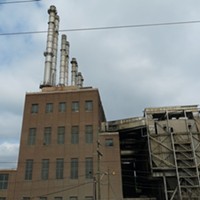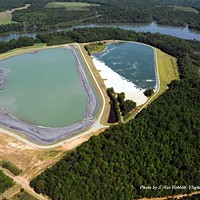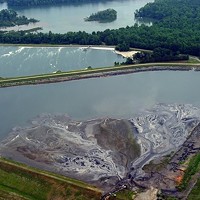On Sept. 14, 2010, the U.S. Environmental Protection Agency came to Charlotte to hold one of eight national hearings on coal ash -- the toxic stuff left behind after power plants burn coal. With more than 450,000 public comments to sort through, and a Congress bent on shackling the agency's authority, the EPA has yet to finalize its decision, leaving coal-ash controls to the states. That's not good enough for the activist organizations Earthjustice, the Environmental Integrity Project and the Appalachian Center for the Economy and the Environment. According to a recent report from those groups, "State of Failure," most states' oversight of coal ash is "grossly inadequate."
That same report ranked North Carolina — home to more high-hazard coal-ash ponds than any other state — seventh on its "12 most dangerous states" list. Calling the ponds here "enormous," the report points to the 5,504,531 tons of coal ash produced in the state each year and the evidence of contaminated groundwater near at least 10 of the sites. Although most of the criticism of N.C.'s regulations don't pertain to the coal-ash ponds affecting Charlotte-area residents, environmentalists are concerned about them.
"We're polluting the primary resource that keeps civilization going," said Catawba Riverkeeper David Merryman, who has called the coal-ash problem in this area "enemy No. 1."
The two unlined ponds in the Charlotte region that the state deems "high-hazard" are located on the edge of Mountain Island Lake, the main drinking-water source for an estimated 1.5 million people. The ponds belong to Duke Energy's Riverbend plant, which began operations on Oct. 29, 1929. It was the last coal power plant to open before the Great Depression, and the last one the company would build until after World War II. Today, Riverbend is potentially the oldest operating coal plant in the country, yet it still helps power Charlotte, as it always has, although it doesn't run quite as often as it once did. According to Duke, the plant only fires up to meet the area's greatest demands — like when we collectively crank the AC or heat — but anyone driving by the red-brick building, located a dozen miles northwest of Uptown off Brookshire Boulevard, can see the yellowish, white or black smoke puffing from its stacks when the plant is in use. And those stacks puff a lot.
Because the plant is so old, its facilities and some of its practices are somewhat antiquated. For example, Riverbend doesn't have the same air-quality controls as newer plants, nor is the coal ash it creates reusable, since it's watered down into a slurry. (At more modern plants, the ash is stored dry, which allows coal companies to sell it to manufacturers that use it as a cheap ingredient in cement and asphalt.) The slurry is stored in the Riverbend plant's two ponds — one more than a half-century old, 41 acres and 80 feet deep, the other more than 25 years old, 28 acres and 70 feet deep.
At nearly 82 years old (the average lifespan of a coal plant is 30 to 40 years), Riverbend's coal-burning days are numbered. That's due, in part, to impending coal-ash regulations from the EPA — regulations the agency has toyed with for more than three decades while attempting to determine whether or not the stuff should be officially deemed hazardous waste. The agency got more serious about coal ash after the December 2008 Tennessee Valley Authority spill that captured attention when more than a billion gallons of it broke through an earthen dam and smothered some 300 acres, including two rivers.
The EPA called it "the biggest environmental disaster ever east of the Mississippi." If the same thing happened here, said Mecklenburg County's water quality program manager Rusty Rozzelle, "it would be the biggest catastrophe Charlotte's ever seen."
Experts agree that the TVA scenario is unlikely in Charlotte, where the concern centers on the hundreds of millions of gallons of ash-pond water that drain into our main drinking-water reservoir each year. The list of heavy metals and potential contaminants that coal ash contains reads like the periodic table: arsenic, beryllium, cadmium, chromium, copper, lead, mercury, molybdenum, nickel, radium, selenium, thorium, uranium, vanadium, zinc. And now, thanks to work by researchers at Duke University, we know it can also include strontium and a more toxic variety of arsenic called arsenic III.
The EPA's initial response to the TVA spill was promising. Teams of engineers and third-party consultants inspected ponds across the country, including the ones at Riverbend. Lisa Jackson, the agency's administrator, promised to enact a ruling on coal-ash waste disposal by the end of 2009. But that time came and went, and instead of a ruling, the agency announced two regulatory options and intentions to hold a series of hearings across several states, including the one in Charlotte last year. The 13-hour local hearing was packed for most of the day, with industry reps citing concerns about coal ash being stigmatized and citizens worried more about pollution and health risks.
Meanwhile, the N.C. General Assembly had taken another look at the state's coal-ash regulations. The ponds, most of which are held in place by engineered earthen dams near rivers and lakes, were once under the regulatory authority of the Department of Commerce and exempt from the Dam Safety Law of 1967. The Assembly changed that in July 2009, putting the Department of Environment and Natural Resources in charge. Under the DENR's watch, coal-ash ponds will now be inspected every two years, instead of every five. While environmental groups point out that groundwater monitoring isn't mandatory at most sites, the state has required Duke Energy to install new groundwater monitoring wells around Riverbend's ponds.
Back in 2000, the coal companies had struck a deal with the EPA, volunteering to monitor the groundwater surrounding coal-ash ponds if the EPA wouldn't regulate the industry. Eight years later, in the same month as the TVA disaster, Riverbend installed its first monitoring wells. But since the data collection was "voluntary," the state hasn't included that information — and won't — in any of its databases.
The original data indicated that the groundwater is contaminated near the Riverbend ponds. That's a concern because of its proximity to Charlotte-Mecklenburg Utilities' drinking-water intake. The catch is that it is completely legal for Duke Energy to pollute water on its own property. "They don't have to meet groundwater standards until the contamination reaches the compliance boundary," said Debra Watts of the DENR's Aquifer Protection Agency. Until the state knows for sure that the ponds are contaminating Charlotte's drinking water — and until it is armed with definitive proof that any exceedances aren't blips — there's not much officials can do. "We just see our job as enforcing the rules," she said.
Watts gets defensive when questioned about the monitoring wells. "It's not like I'm saying we shouldn't have been doing this all along, or that this is a good thing," she said. Like everyone else, the state is bound by the law and is waiting on the EPA to figure out what to do.
Today, the DENR has three additional sets of data from groundwater monitoring at the plant. The new data indicates that the water is acidic and that levels of iron and manganese are consistently violated. Environmental advocate Merryman, the Catawba Riverkeeper who watchdogs our drinking water, has found that the water's acidification — its Ph — "can drastically affect how chemicals and metals react." Merryman has accompanied Duke University scientists to the reservoir and says they are now finding arsenic III and strontium, which can be radioactive, in Mountain Island Lake's sediment. It was the first time Merryman connected the elements to local coal ash, but the EPA has confirmed that "yes, these elements have been associated with coal ash in other locations."
The problem is that neither the county, the state nor the EPA runs tests on the lake's sediment. "You're completely missing the forest for the trees if you don't look at the sediment," said Merryman, "because that's where everything is accumulating. The state has effectively decided to put blinders on to what is happening."
Merryman's concern is that the lake, one of the smallest and shallowest of the Catawba River's 11 dammed reservoirs, doesn't get enough government attention, especially given that it is Charlotte's drinking water. Fortunately, he has not found dangerous elements in Charlotte's tap water. But he believes the state cannot ignore the problem for much longer. "I think when [Duke University's] report comes out, it could force the state to start paying attention to the sediment."
Duke Energy plans to stop burning coal at Riverbend between 2015 and 2018, although critics point out that the company previously said it would close the plant as early as this year. When it will be closed depends largely on what regulations the EPA enacts over the next few years.
Riverbend probably will not close for good, however. Erin Culbert, a Duke Energy public relations representative, said it could be converted into a natural-gas facility, or potentially be used to burn trees the state has designated for use as renewable energy. Whatever happens to the plant, the coal-ash ponds are there to stay, and they will be the first in North Carolina's history to be retired. Watts said the state will control the closure of the ponds, and Duke Energy has said it is prepared to comply, promising to monitor the wells for the foreseeable future no matter what happens regulation-wise.
That doesn't do much to ease the concerns of area citizens, many of whom weren't aware the ponds existed until the EPA released its list of 49 high-hazard coal-ash ponds the summer after the TVA spill. Duke Energy owns 10 of the 12 North Carolina-based ponds on the list, although the EPA later reclassified the two Riverbend ponds as "satisfactory." That means, essentially, that the grass-covered earthen dams that hold the ponds in place are structurally sound, but it does not take into account the tainted runoff that enters the Charlotte reservoir.
Besides releasing reports and asking for feedback, the EPA hasn't done anything but make promises. Meanwhile, everyone — Duke Energy, the state, environmental groups, concerned citizens — continues to wait for the agency to determine whether coal ash should be treated as a hazardous waste or as regular trash. The EPA estimates that nationally it will cost $20.3 billion a year to regulate coal ash as a hazardous waste and $8.1 billion to regulate it as non-hazardous. The agency also estimates this regulation will save $290 billion annually in health-care costs.
Never mind the health-care savings, though. The coal industry, and companies incorporating coal-ash into their products, scream "stigma." While the companies can't point to any specifics, they're concerned that any regulation at all will make coal ash less attractive to their customers.
According to Culbert, Duke Energy brought in $2 million in 2010 from sales of coal ash — the dry ash, not the gunk in Riverbend's ponds. "Beneficial reuse also benefits the company because we don't have to dispose of the material," she said. "If you add revenues and savings, the benefit to the company was more than $30 million" last year.
That may explain why, according to OpenSecrets.org, Progress and Duke share the No. 1 spot for the most mentions of "coal ash" — 56 combined — in federal lobbying documents. It also may explain why the amount of lobbying money both companies spent spiked last year. If the two merge, it will be the country's largest energy company, which means power in Washington.
This lobbying, together with the current anti-EPA Congress, has effectively stalled the decision-making process. Now, nearly three years after the TVA disaster and a year after the EPA's hearings, coal-ash regulation remains in the same holding pattern it's been in for decades. Asked when the public might expect a ruling, the EPA replied simply, "Currently, no date has been set."
At least the agency that "protects" our environment has stopped making promises it can't keep.



